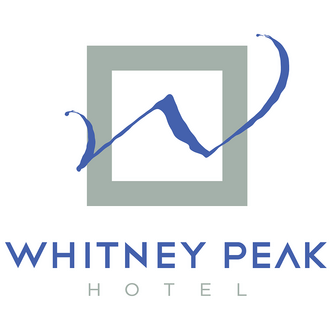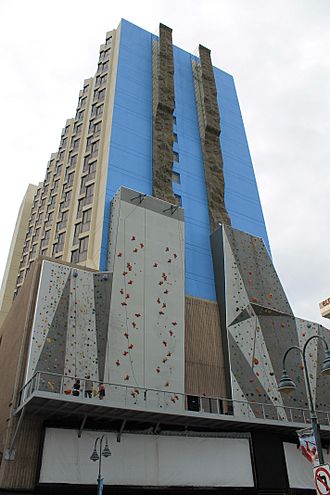Whitney Peak Hotel facts for kids
Quick facts for kids Whitney Peak Hotel |
|
|---|---|
 |
|

Whitney Peak Hotel
|
|
| Former names | Fitzgeralds Reno (1976–2008) CommRow (2011–2013) |
| General information | |
| Address | 255 North Virginia Street |
| Town or city | Reno, Nevada |
| Country | United States |
| Groundbreaking | 1974 |
| Construction started | 1974 |
| Completed | 1976 |
| Opened | May 17, 1976 |
| Renovated | 2011, 2013 |
| Cost | $1.5 million |
| Renovation cost | $1.5 million |
| Owner | DRW Holdings LLC |
| Height | 50 ft (15 m) |
| Technical details | |
| Floor count | 16 |
| Floor area | 420 m2 (4,500 sq ft) |
| Lifts/elevators | 4 |
| Design and construction | |
| Architecture firm | Worth Group |
| Other information | |
| Number of rooms | 347 |
| Number of suites | 347 |
| Number of restaurants | 1 |
The Whitney Peak Hotel is a cool hotel in Downtown Reno, Nevada. It used to be called Fitzgeralds Reno and CommRow. Today, it's known for being a hotel without a casino. DRW Holdings LLC owns and runs it.
Contents
The Story of Whitney Peak Hotel
Fitzgeralds Reno: From 1976 to 2008
Construction on this building started in 1974. Lincoln Fitzgerald, who owned the Nevada Club casino, wanted a new hotel. It was planned to be 16 stories tall and have 347 rooms.
The hotel opened on May 17, 1976. It was called Fitzgeralds Reno. Building it cost about $16 million.
After Lincoln Fitzgerald passed away in 1981, his wife, Meta, sold the hotel. This happened in 1986. The Lincoln Management Company bought it for $26.25 million.
Fitzgeralds Reno was the last of four properties owned by Fitzgeralds Gaming to be sold. The company had faced financial troubles in 2000. Other Fitzgeralds hotels were in Las Vegas, Tunica, and Black Hawk.
In 2005, another company, Monarch Casino & Resort, tried to buy Fitzgeralds Reno. Then, in April 2007, a company from Chicago, Illinois, called L3 Development, wanted to buy it. They planned to turn it into a special "boutique" hotel.
On November 1, 2007, L3 Development and RAC II LLC officially became the new owners. This was the first time in many years that the property was owned by private companies.
The Rainbow Bridge
Imagine a time when trains often blocked the way to Fitzgeralds! The First Transcontinental Railroad tracks made it hard for people to get to the hotel from the north.
So, in the 1990s, Fitzgeralds built a special footbridge. It went over the train tracks. You could get to it from a castle-like tower. This tower was across the street from the Eldorado hotel.
Guests would go into the tower and ride escalators up. After crossing the bridge, they would arrive at a place called the Lucky Forest.
Later, a big project called ReTRAC built a trench for the trains. This made the bridge unnecessary. It also got in the way of new street structures. So, the Rainbow Bridge was taken down in 2007.
CommRow: 2011 to 2013
On October 1, 2008, Fitzgeralds Reno announced it would close. It shut down in November 2008. About 470 employees lost their jobs. The new owners thought about what to do with the building.
The lower floors of the building reopened as CommRow on October 1, 2011. It had something very cool: the world's tallest climbing wall on its outside! CommRow was supposed to have a hotel, but that part never opened. The business struggled, and it closed on January 1, 2013.
Whitney Peak Hotel: 2014 to Today
After CommRow closed, the Whitney Peak Hotel was announced as its replacement. The owners from Chicago decided to completely rebuild the inside of the old structure.
The new Whitney Peak Hotel opened on Memorial Day weekend in 2014. It was totally renovated. You won't find any signs of the old CommRow or Fitzgeralds Reno inside.
Only a few things remain from the past. These include the 164-foot tall climbing wall on the outside, the indoor climbing boulders, and the Blarney Stone monument. Today, the Whitney Peak Hotel is a unique place to stay in Reno!
 | James Van Der Zee |
 | Alma Thomas |
 | Ellis Wilson |
 | Margaret Taylor-Burroughs |

